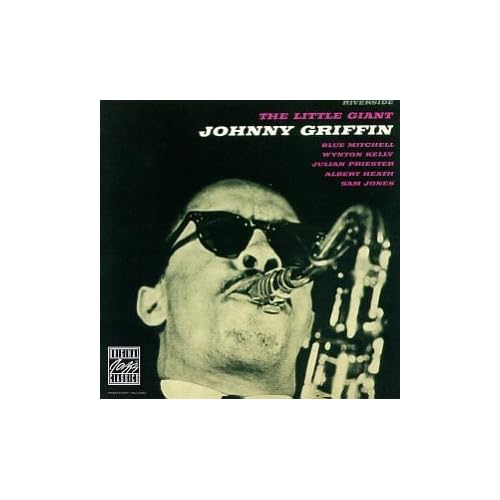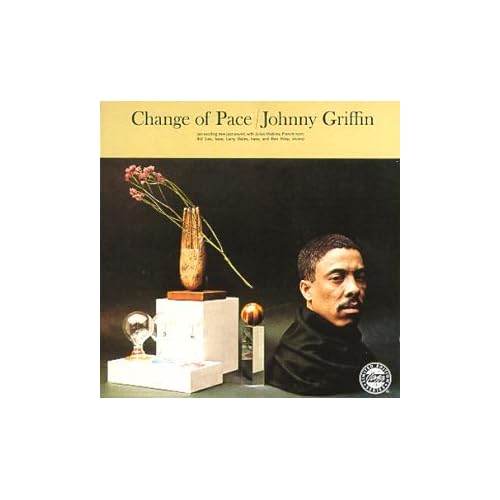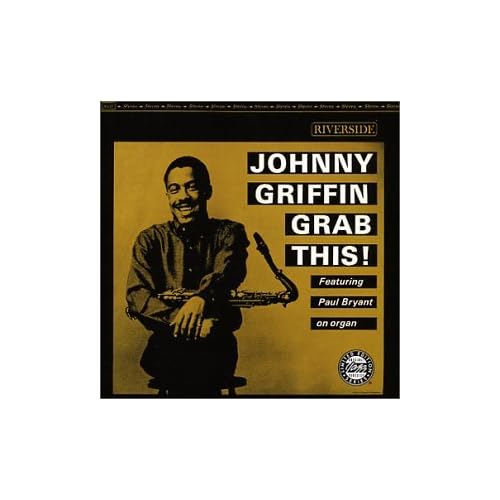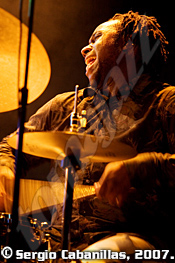Apodado "Little Giant" por su corta estatura, Johnny Griffin, es uno de los últimos grandes creadores y exponentes todavía en activo mas genuinos del hard-bop. Nació en Chicago, uno de los centros urbanos mas importantes del blues y también del gospel, dos raíces musicales que marcaran beneficiosamente a Griffin durante sus años de formación. De madre cantante y padre cornetista, estudio muy pronto obóe, clarinete y saxofón alto y tenor en la famosa "Dusable High School" de su ciudad natal como alumno del no menos famoso Captain Walter Dyett, director musical de la escuela.
Su estreno musical le llegó a los 17 años cuando recién graduado se vio contratado gracias a su magnifica reputación por la banda de Lionel Hampton. Se unió a ellos en la primera gala de la gira en Toledo (Ohio) y ahí permaneció dos largos y fructíferos años. Regresó a Chicago en 1947 y codirigirá junto al trompetista, Joe Morris, un sexteto por cuya sección rítmica pasaron dos pesos pesados del jazz: el contrabajista, Percy Heath y el baterista, Philly Joe Jones. Llega la guerra de Corea y Griffin es movilizado y destinado a Hawai donde pasara dos años ( 1951-1953) tocando en la banda militar de la compañía.
Ya licenciado vuelve a su ciudad natal donde un buen día de 1956, aparece por allí el pianista Thelonious Monk, para cumplir un contrato de 15 días en el club "Bee Hive". Griffin es seleccionado de entre los músicos locales para tocar junto a Monk y a la vuelta el pianista habla maravillas de aquel saxo tenor de Chicago a su compañía discográfica por entonces, la Blue Note quienes tras una primera escucha lo contrata y un mes después graba el primer disco a su nombre: "Chicago Calling" todo un monumento del mejor hard bop de la época. Las cosas empiezan a suceder deprisa y Art Blakey, lo contrata para uno de sus Messengers y grabará con ellos tres álbumes, entre ellos uno con Monk al piano. Otra vez Monk se cruza en su camino y lo llama al año siguiente para sustituir nada mas y nada menos que a John Coltrane, en su cuarteto para grabar en el club "Five Spot" en 1958 y grabadas para Riverside bajo el titulo de "Misterioso".
En 1960 lo contrata su colega Eddie "Lockjaw" Davis, que le propone formar un grupo con dos saxos tenores y sección rítmica. La formula es todo un acierto y el éxito les acompaña desde el principio -graba ocho discos en dos años- pero la situación fiscalmente se tuerce y Johnny Griffin, decide irse a Europa harto de soportar las presiones del fisco americano. Griffin recorre Europa de cabo a rabo pero termina instalándose en Francia donde colabora entre 1962 y 1973 con la extraordinaria institución musical que fue la bigband de Kenny Clarke y Francy Boland. En el 1970 se traslada a vivir a Holanda donde se compra una granja y alterna las grabaciones y actuaciones con el cuidado de la misma. Visita España al final de la década de los setenta donde toca con el pianista, Tete Montoliu, y realiza anualmente un viaje a su patria para no ser olvidado. Falleció en julio de 2008 a los 80 años en un pueblo del centro de Francia, donde vivía autoexiliado desde 1963.
Johnny Griffin (tenor sax)
Donald Byrd (trumpet)
Pepper Adams (baritone sax)
Kenny Drew (piano)
Wilbur Ware (bass)
Philly Joe Jones (drums)
1. Stix' Trix
2. What's New
3. Woody'n You
4. Johnny G.G.
5. Catharsis
Recorded at Reeves Sound Studios, New York, New York on February 25, 1958
Johnny Griffin - Introducing Johnny Griffin (RVG-edition)
320 kbps + covers
This CD reissue does not have tenor saxophonist Johnny Griffin's first recording as a leader (he made a few sides for OKeh in 1953 and a full album
for Argo a few months earlier in 1956), but it gained Griffin a great deal of attention. Soon billed as "the world's fastest saxophonist," Griffin was also a superior ballad interpreter with a fairly distinctive tone of his own. With strong support given by pianist Wynton Kelly, bassist Curly Russell, and drummer Max Roach, Griffin romps on three of his originals, barn-busting versions of "The Way You Look Tonight" and "Cherokee" (the latter two were not on the original vinyl LP but included as bonus tracks on the initial CD release of the album), and a couple of ballads. Superior music. [In 2007 Blue Note reissued Introducing Johnny Griffin in a remastered Rudy Van Gelder edition.]
01. (00:03:57) Johnny Griffin - Mil Dew
02. (00:05:39) Johnny Griffin - Chicago Calling
03. (00:05:12) Johnny Griffin - These Foolish Things
04. (00:04:58) Johnny Griffin - The Boy Next Door
05. (00:04:23) Johnny Griffin - Nice and Easy
06. (00:05:03) Johnny Griffin - It's All Right with Me
07. (00:07:57) Johnny Griffin - Lover Man
08. (00:06:24) Johnny Griffin - The Way You Look Tonight
09. (00:04:18) Johnny Griffin - Cherokee
Playing Time.........: 00:47:50
53 Johnny Griffin - The Jazz Masters
01. Isfahan (10:48)
02. Take My Hand (9:39)
03. All Through The Night (6:30)
04. Coming On Hudson (5:17)
05. Woe Is Me (11:07)
06. Hush-A-Bye (7:33)
07. Out Of This World (6:05)
08. If I Should Loose You (8:00)
Johnny Griffin - The Little Giant (1959)
Artist: Johnny Griffin
Album: The Little Giant
Label: Riverside
Quality: FLAC & MP3@320
Size: 232 MB & 76 MB
Time: 34:17
This CD reissue is a bit offbeat, for the set by tenor saxophonist Johnny Griffin features three originals by then-obscure pianist Norman Simmons, a reworking of the pop tune "Playmates," Babs Gonzalez's "Lonely One" and the tenor's "63rd Street Theme." Simmons' arrangements for the three horns (which include trumpeter Blue Mitchell and trombonist Julian Priester) are colorful; the rhythm section (pianist Wynton Kelly, bassist Sam Jones and drummer Albert "Tootie" Heath) is state-of-the-art for the period, and Griffin (who is featured in a trio with Jones and Heath on "The Lonely One") is in fine form. An interesting set of obscure straight-ahead jazz. ~ Scott Yanow, All Music Guide
Personnel:
Blue Mitchell (tp)
Julian Priester (tb)
Johnny Griffin (ts)
Wynton Kelly (p)
Sam Jones (b)
Al Heath (ds)
Track Listings:
1. Olive Refractions (Norman Simmons)
2. Message (Norman Simmons)
3. Lonely One (Babs Gonzales)
4. 63rd Street Theme (Johnny Griffin)
5. Playmates (Saxie Dowell)
6. Venus and the Moon (Norman Simmons)
Recorded: Aug. 4 & 5, 1959
MP3@320
Johnny Griffin - Change Of Pace
Artist: Johnny Griffin
Album: Change Of Pace
Label: Riverside
Year: 1961
Genre: Jazz
Format: MP3: 320kbit/s
Time: 39:13
Size: 89,17 Mb (Megaupload)
Tenor saxophone, French horn, drums, two string basses; a change of pace, indeed, brought off with adventurousness and aplomb by Johnny Griffin. By 1961, when he recorded Change of Pace, Griffin had built a reputation as one of the most formidable hard-bop tenors. His greased-lightning abilities with the saxophone were well known from his work with Art Blakey, Thelonious Monk, and the group he co-led with Eddie "Lockjaw" Davis. Less recognized was the breadth of knowledge and curiosity that led Griffin to this unusual project. The instrumentation allowed textures more common to modern classical chamber music than to jazz. The experience and inclination of the players guaranteed unfettered swing. All of the compositions but one are by Griffin or his colleagues. His "Why Not'" underlines his admiration for Stravinsky with a melody line alluding to "Petrouchka."
with Julius Watkins, Bill Lee, Larry Gales, Ben Riley
Best tracks : Soft and Furry, Nocturne
Tracks:
1. Soft and Furry (Johnny Griffin) 3:58
2. In the Still of the Night (Cole Porter) 3:25
3. The Last of the Fat Pants (Johnny Griffin) 4:17
4. Same to You (Johnny Griffin) 4:19
5. Connie's Bounce (Consuela Moorehead-Lee) 3:55
6. Situation (Julius Watkins) 3:51
7. Nocturne (Bill Lee) 5:21
8. Why Not? (Johnny Griffin) 4:57
9. As We All Know (Bill Lee) 4:44
Performers:
Johnny Griffin (tenor saxophone)
Julius Watkins (French horn)
Bill Lee (bass)
Larry Gales (bass)
Ben Riley (drums)
Rec.Feb 7, 1961
Johnny Griffin - Grab This! (1963)
Artist: Johnny Griffin
Album: Grab This!
Year: 1963
Label: OJC/Riverside
Format: MP3 @320kbps
Size: 93mb (RS.com, w/ 5% file recovery)
Includes Covers + Liner Notes
Grab This! finds tenor Johnny Griffin in a soul-jazz mood, which is greatly aided by the organ of Paul Bryant. They are joined by guitarist Joe Pass, bassist Jimmy Bond, and drummer Doug Sides for nice workouts on several originals and a couple of standards. The band seems confident and relaxed throughout this recording, injecting everything it touches with a healthy dose of the blues. Griffin's tone is rich and full throughout, but is most striking on Ellington and Russell's "Don't Get Around Much Anymore" and the self-penned original "Grab This!" Bryant has been given special guest status, and his style is perfectly matched with Griffin's...
He also wrote the wonderful "Offering Time," a slow blues piece with a strong groove. While Pass' role here is more supportive, he turns in several fine solos, as on "63rd Street Theme" and "Offering Time." What is perhaps most striking about Pass' role here is his versatility: he appears as comfortable playing soul-jazz as he would playing hard bop or swing. Bond and Sides supply the steady rhythm needed to keep this soul-jazz moving along. It's amazing that five guys were able to get together and cut this album for Riverside in one day during the summer of 1962. Like Carmell Jones, Griffin moved to Europe in the '60s, lowering his profile in the United States. Grab This! is a fine album, and serves as a reminder of Griffin's lovely tenor sound. ~ Ronnie Lankford Jr., All Music Guide
Amazon.com reviewer:
Featuring Paul Bryant on organ, a very subdued Joe Pass (barely heard, but when he is, as tasty as chicken soup), Jimmy Bond on bass and Doug Sides on drums, this album swings in the painful sense of the word. Johnny Griffin's deep, warm, soulful, fluid and groovin' tone aside, Paul Bryant takes some of the richest and tastiest sounding organ solos probably ever laid down in any studio... in particular he's a master at chordal style soloing... but can also lay down the bop and gospel as well... much "cooler" than Milt Buckner, and leading more towards Johnny Hammond Smith you can hear, smell and feel the double Leslie spinnin on behind Johnny Griffin who takes you straight to heaven. Grab This *is* aptly titled... it *is* something you should grab... a collection of fantastic mid-tempo grooves recording in the summer of '62 and produced by the great Orrin Keepnews, this CD is Griffin's first recording with an organ combo that walks a rewardingly fine line between "soul Jazz" and heavy swing. Griffin outdoes himself on each cut, and if Offering Time doesn't make you want to get out the tamborine and movin' around or These Foolish Things don't want to make you make love, the answer is simple... yuh' ain't got no soul. This CD is a must have ! Also check out Freddy Roach's Good Move and Johnny Hammond Smith's Black Coffee if you dig this sound.
Personnel:
Johnny Griffin (tenor sax)
Paul Bryant (organ)
Joe Pass (guitar)
Jimmy Bond (bass)
Doug Sides (drums)
Recording Date : Jun 28, 1962
Tracks:
1. Grab This! (Griffin) 6:06
2. 63rd Street Theme (Griffin) 5:34
3. Don't Get Around Much Anymore (Ellington, Russell) 8:37
4. Offering Time (Bryant) 6:16
5. These Foolish Things (Link, Marvell, Strachey) 6:39
6. Cherry Float (Griffin) 5:29
Johnny Griffin - Do Nothing Til You Hear From Me (1963)
Artist: Johnny Griffin
Album: Do Nothing Til You Hear From Me
Year: 1963
Label: Riverside
Time: 36:13
Format: MP3 @320kbps
Size: 92mb (RS.com, with 5% WinRar File Recovery)
Includes Covers + Notes
Johnny Griffin, known as the world's fastest tenor-saxophonist in the late 1950's, purposely slowed down a bit on some of his later Riverside albums including this set which was reissued on a 1998 CD. Griffin is joined by pianist Buddy Montgomery (who switches to vibes on two of the six numbers), bassist Monk Montgomery (heard in a rare outing on acoustic bass) and drummer Art Taylor. They perform four standards (including "The Midnight Sun Will Never Set" and "That's All") and a couple of Griffin's basic originals. The music swings and the classic tenorman cuts loose a few times, making for enjoyable if not quite essential music. - AMG
Personnel:
Johnny Griffin (tenor saxophone);
Buddy Montgomery (vibraphone, piano);
Monk Montgomery (bass);
Arthur Taylor (drums)
Recorded at Tsubo, Berkeley, California in June 1963. Originally released on Riverside (9462). Includes liner notes by Joe Goldberg.
Tracks:
1. Do Nothin' Til You Hear From Me
2. The Midnight Sun Will Never Set
3. That's All
4. Slow Burn
5. Wonder Why
6. Heads Up
Johnny Griffin - The Congregation (1957)
Artist: Johnny Griffin
Album: The Congregation
Year: 1957
Label: Blue Note
Format: MP3 @320kbps
Size: 89 mb (RS.com w/ 5% file recovery)
AMG Rating: 5 stars
The Rudy Van Gelder-helmed reissue of 1957's THE CONGREGATION improves on what is already a classic Johnny Griffin date. Backed by Paul Chambers on bass, Kenny Dennis on drums, and Sonny Clark on piano, Griffin demonstrates his usual dazzling dexterity on the tenor sax. The mode is straightforward bop, with a balance of uptempo numbers and ballads, and plenty of stretching out all around. This set comes highly recommended--especially given the improved sound of the reissue--to fans of the style. - Cduniverse.com
Allmusic.com:The great tenor saxophonist Johnny Griffin is heard in top form on this near-classic quartet set. Assisted by pianist Sonny Clark, bassist Paul Chambers, and drummer Kenny Dennis, Griffin is exuberant on "The Congregation" (which is reminiscent of Horace Silver's "The Preacher"), thoughtful on the ballads, and swinging throughout. It's recommended for bop collectors.
Allaboutjazz.com:On this 1957 session, the “world’s fastest tenor” sets aside his gun-slinging ways in favor of comparatively restrained, straightforward preaching, consisting of some basic, rather predictable harmonic-rhythmic rhetoric and, of course, that distinctive sound. Griffin’s ample and slow Leslie- like vibrato is somewhat reminiscent of Dexter Gordon’s but without the long tall one’s frequently sardonic send-up of swing-era clichés, replacing them with tension-filled, dramatic alternatives derived from a chord's extended harmonies. In brief, the program on The Congregation is curiously unengaging: it would almost seem the “Little Giant” dispatched more souls with his six-shooters than his sermonizing.
A sense of over-familiarity sets in immediately with the introductory title song, a thinly disguised variation on Horace Silver's “The Preacher.” The remaining five tunes, including the ballad “I’m Glad There Is You,” all gravitate toward the same groove—a medium-up tempo in the key of concert F (a recurrent top tone in the tenor solos as well). And as solid, even sparkling, as they are, Paul Chambers’ bass solos on each of the tunes—at least three of them bowed—tend to underscore the repetitive, formulaic nature of the proceedings.
The virtuosity and rapid-fire articulations of the gifted tenor man begin to emerge on John Jenkins’ “Latin Quarter” (somewhat of a misnomer) with a couple of heated, double-timed choruses and an arresting cadenza, but the momentary spark is extinguished until Jule Styne’s always welcome “It’s You Or No One” which, though again in F, is at least taken at a slightly brighter tempo. Pianist Sonny Clark and Chambers are a flawless team as usual, and the somewhat unusual employment of drummer Kenny Dennis does nothing to obstruct their customary flow. The bonus track, “I Remember You” (in F, naturally), is another nice standard but does little for the program. Its inclusion, in fact, begs comparison with Cannonball Adderley’s superb Cannonball Takes Charge (Riverside, 1959), a session that employs the same instrumentation and a similar program yet maintains a hard, gemlike flame throughout.
Personnel:
Johnny Griffin - tenor saxophone
Sonny Clark - piano
Paul Chambers - upright bass
Kenny Davis - drums
Tracks:
1. The Congregation
2. Latin Quarter
3. I'm Glad There Is You
4. Main Spring
5. It's You Or No One
6. I Remember You (Bonus Track)
Johnny Griffin - A Blowing Session (1957)
Artist - Johnny Griffin
Album - A Blowing Session
Genre - jazz, hard-bop
Label - Blue Note
Year - 1957, release - 1988
Quality - MP3@320kb/s
Size - 57,8 mb
Total time - 38:23
Track List
1. Way You Look Tonight, The 10:15
2. Ball Bearing 09:42
3. All The Things You Are 08:11
4. Smoke Stack 10:11
Total time - 38:23
Personnel: Johnny Griffin, Hank Mobley, John Coltrane (tenor saxophone); Lee Morgan
(trumpet); Wynton Kelly (piano); Paul Chambers (bass); Art Blakey (drums).
Producer: Alfred Lion.
Recorded at the Van Gelder Studio, Hackensack, New Jersey on April 6, 1957. Originally released on Blue Note (1959).
This early date for saxophonist Johnny Griffin is one of his best. In addition to Griffin's renowned skill and speed on the tenor sax--which is evident throughout 1957's A BLOWING SESSION--the personnel here comprises an almost unbelievable all-star lineup. With Art Blakey's hard-swinging thunder on the drums, Paul Chambers holding down delicate-yet-complex bass lines, and Wynton Kelly's bluesy touch on the piano, the rhythm section is simply unbeatable. Add to this young firebrand Lee Morgan on trumpet, and the triple saxophone threat of Griffin, Hank Mobley, and John Coltrane, and you have one of the most talented bands of the hard-bop era.
These musicians existed in the same general orbit--all had played with groups led by Dizzy Gillespie, Miles Davis, or Blakey himself. As expected, they display a marvelous rapport, with plenty of fine interplay, invention, and heat to keep things cooking. The set features two Griffin originals and two standards ("The Way You Look Tonight," played at breakneck speed, and the lightly swinging "All the Things You Are"). The album is aptly named--Morgan, Coltrane, Mobley, and Griffin are in dazzling form on every track. This hard-bop classic deserves a place in every jazz fan's library.
Johnny Griffin - Take My Hand (1988)
Release Date: 1988
AMG Album ID: R 190486
Quality: mp3@320
Size: 124 Mb
Track list:
1. Isfahan
2. Take My Hand
3. All Through The Night
4. Coming On The Hudson
5. Woe Is Me
6. Hush-A-Bye
7. Out Of This World
8. If I Should Lose You
 Hacemos un parentesis para resaltar la noticia de que el saltador de longitud Irving Saladino, hoy 18 de agosto 2008 nos lleno de orgullo al ganar la 1ra. medalla de oro que un panameño alcanza en la historia de los Juegos Olímpicos esta vez en Beijing, China .
Hacemos un parentesis para resaltar la noticia de que el saltador de longitud Irving Saladino, hoy 18 de agosto 2008 nos lleno de orgullo al ganar la 1ra. medalla de oro que un panameño alcanza en la historia de los Juegos Olímpicos esta vez en Beijing, China .




























